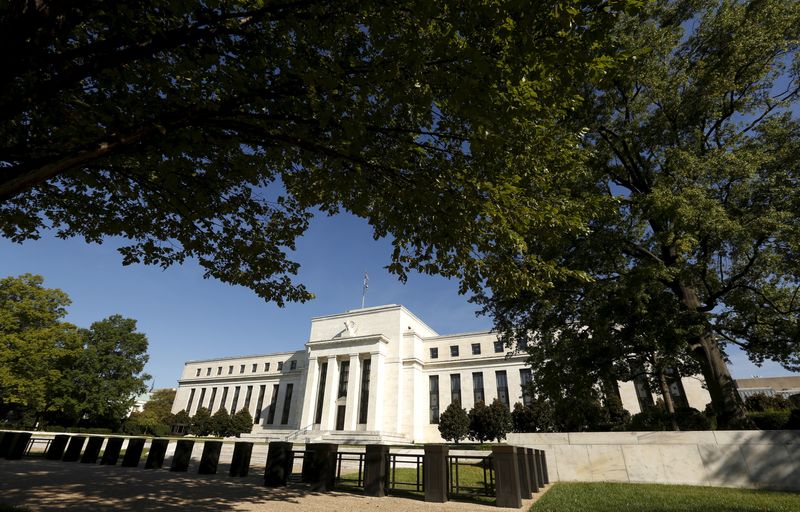By Michael S. Derby
NEW YORK (Reuters) -The Federal Reserve’s internal debate over the fate of its balance sheet reduction effort is set to quicken at its March policy meeting, with policymakers first setting the stage for how they'll likely slow the drawdown, likely deferring a decision on when to stop the process altogether to a later date.
Minutes of the central bank’s Jan. 30-31 Federal Open Market Committee meeting, released on Wednesday, showed "many participants" were eager to kick off "in-depth discussions" at their March 19-20 meeting on how they will conclude what has been a steady reduction in the Fed’s bond holdings.
Officials reckoned with cash draining steadily out of a key central bank tool known as the overnight reverse repo facility -it's viewed as a proxy for excess financial sector liquidity -the time is close at hand for managing an endgame that will keep financial markets unruffled. To get there, officials are ready for a full-scope debate over how to eventually slow the process commonly referred to as quantitative tightening, or QT, at their March FOMC meeting.
While there's uncertainty whether all the cash will drain out of the reverse repo facility, wherever it stabilizes means bank reserves will start falling quickly. This overall tightening in liquidity means the Fed must be prepared to shift the QT process.
Some Fed officials said at the January meeting that amid uncertainty over how much liquidity the financial system needs, slowing the pace of the contraction is a good first step. The minutes also said “a few” policymakers believe QT can proceed “for some time” even after the Fed starts cutting its short-term interest rate target.
Fed Chair Jerome Powell flagged the upcoming debate at the press conference following last month's FOMC meeting. The minutes also echo views of policymakers who have started debating how the Fed can complete QT smoothly.
ENDGAME IN SIGHT
The Fed more the doubled the size of its holdings starting in March 2020 to a peak of nearly $9 trillion by the summer of 2022, using bond purchases to stabilize markets and provide stimulus beyond the near zero federal funds rate then in place. The current size of the Fed's balance sheet is $7.7 trillion.
The Fed has been reducing the size of its holdings since 2022. It is allowing up to $95 billion in Treasury and mortgage bonds to expire each month and not be replaced. With a QT slowdown, or taper, officials would likely lower that cap to buy the central bank time on deciding when to stop altogether.
The QT process complements Fed rate hikes aimed at cooling high levels of inflation. With price pressures heading back to the 2% target Fed officials are openly weighing when they can lower the federal funds target rate from its current 5.25% to 5.5% level.
"March is the first time they'll do a deep dive into how to taper," said Derek Tang, an analyst at forecasting firm LH Meyer. "The end point will take a lot more work to suss out since it hinges on things outside of their control like market sentiment and regulatory reform."
Tapering the drawdown is important because both inside and outside the Fed there is great uncertainty over the level of liquidity that's needed to afford the central bank control over its short-term rate target while allowing for acceptable levels of volatility in money markets.

When the Fed last engaged in a QT process it unexpectedly withdrew liquidity to such a level in September 2019 that it was forced to start adding it back in large amounts to restore stability to short-term markets. The Fed doesn't expect a replay of that in part due to new tools, but even so, most believe it doesn't want to test the market by withdrawing liquidity too aggressively.
"We believe the Fed does not want to repeat its past errors with quantitative tightening, which led to a disruption in the repo market," which makes the case for starting the process with a taper, said Ryan Sweet, U.S. economist with Oxford Economics. "Ending QT does not appear on the horizon and tapering soon would allow the process to last longer."